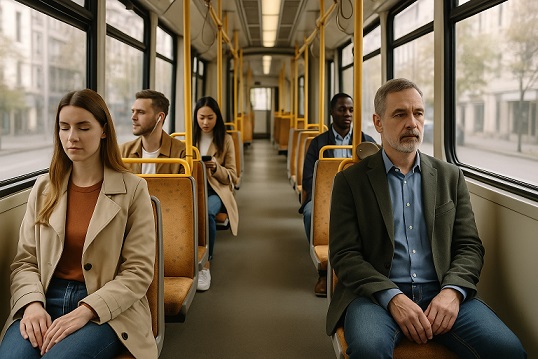
You step onto a German tram. It’s clean, quiet, and surprisingly fast. But as you fumble for a seat and begin a phone call, you notice something odd: everyone is silent. Some passengers glance up. A few frown. You’ve just broken one of the unwritten rules of German public transport.
Trains, trams, buses, and subways in Germany are more than just ways to get around. They’re extensions of the country’s cultural mindset – where efficiency, structure, and consideration for others guide behavior. Knowing how to navigate this unspoken social code can make your journey smoother – and your presence more welcome.
In this guide, we’ll explore the rules (spoken and unspoken) of riding public transport in Germany, and why they matter so much in everyday life.
Why Etiquette on Public Transport Matters
In Germany, public transport isn’t just popular – it’s part of everyday life for millions. Students, professionals, pensioners, and tourists alike rely on buses, S-Bahns, U-Bahns, and regional trains.
Because so many people use it – and often in close proximity – behavioral norms matter. These norms aren’t written in the official transport regulations, but they’re strongly felt. They help preserve the core values of German life:
- Efficiency – Trains run on time; people board quickly.
- Quietness – Silence is golden, especially in enclosed spaces.
- Respect – Don’t disturb, block, or inconvenience others.
- Responsibility – You’re expected to know and follow the rules without reminders.
Think of it like Germany’s famous quiet hours or rotating stairwell cleaning: no one is watching, but everyone still does their part.
The Basics: Tickets, Zones, and Trust
Before discussing etiquette, let’s cover one of the most important practical aspects of German public transport: the ticket system.
No Turnstiles, But Not a Free Ride
In Germany, there are no ticket gates at subway or train entrances. You simply buy a ticket and walk onto the platform or train.
But don’t be fooled: this is not an honor system. It’s a trust system backed by surprise enforcement.
Plainclothes inspectors regularly patrol trains and trams. If you’re caught without a valid ticket, you’ll face a standard fine of €60 or more (Schwarzfahren – riding without a ticket – is a criminal offense).
Etiquette tip: Always validate your paper ticket before boarding by stamping it at the small orange or blue machines. Many tourists forget this step and are fined even with a ticket in hand.
The Golden Rule: Be Quiet
If there’s one rule that defines German public transport, it’s this: Keep the noise down.
- Phone calls should be brief and quiet – if not avoided altogether.
- Conversations, if necessary, should be spoken in low tones.
- Loud laughter or group chatter is frowned upon, especially during rush hours.
- Music must be listened to with headphones – and at a volume only you can hear.
- Children should be kept calm (and many German parents are impressively good at this).
This culture of silence isn’t about being unfriendly. It’s about creating a peaceful, shared environment – one where everyone can travel undisturbed.
For more on this national preference, see: Silence in German Culture: Why Quietness Is a Virtue
Boarding and Exiting: Efficiency First
Germans value orderly boarding and swift exits. You’ll notice this especially at tram and U-Bahn stops.
- Let people exit before you enter. Always.
- Stand to the side of the doors—not directly in front.
- Have your belongings ready before disembarking.
- Keep the flow moving. Lingering in the doorway is a major faux pas.
On escalators, especially in large stations, the custom is to stand on the right, walk on the left—a habit so ingrained that breaking it may earn you a sharp “Entschuldigung!”
Seat Etiquette: Who Gets Priority?
Most German public transport vehicles have priority seating for the elderly, disabled, pregnant women, or passengers with children. These are typically marked with icons.
Even if you’re sitting in a non-priority seat, it’s expected that you offer your seat if someone clearly needs it more.
Also:
- Don’t block seats with bags. Put them on your lap or the floor.
- Don’t put your feet on the seats. It’s unhygienic – and ticket inspectors may fine you.
- If the train is crowded, slide in to make room. Germans won’t usually ask; they’ll just wait until you move.
Food, Drinks, and Manners
While eating on public transport isn’t illegal, it’s discouraged – especially if the food is hot, greasy, or smelly. Drinking alcohol is generally allowed on regional trains and trams, but frowned upon on local U-Bahn and S-Bahn systems in cities like Berlin and Hamburg.
Some cities (like Munich) have strict no-alcohol rules on public transport, especially during Oktoberfest season.
Politeness matters:
- A simple “Hallo” or nod when entering a nearly empty compartment is common.
- A “Danke” when someone moves to make room is appreciated.
- Use a calm, respectful tone – even when asking someone to move or lower their music.
Bikes, Dogs, and Big Bags
If you’re carrying large items, be mindful of space.
- Bicycles often require a separate ticket and are only allowed during off-peak hours on certain lines.
- Dogs are allowed on most trains but usually need a half-price ticket unless in a carrier.
- Strollers and wheelchairs have designated spaces – respect them.
- If your backpack is bulky, remove it when standing, especially on crowded trams.
In short: your convenience shouldn’t come at the expense of others.
Night Buses and Regional Differences
At night, especially in rural areas or after U-Bahn service ends, Germans rely on night buses or replacement services. These follow different schedules and often require a press of the “Stop” button well in advance of your stop.
Regional variations include:
- Berlin: More relaxed, but still polite.
- Munich: More formal and rule-driven.
- Hamburg: Efficient but with a more maritime attitude – less chatty, more direct.
- Rural areas: Buses may come only once per hour; don’t miss them.
Public Transport and the German Mindset
Everything about German public transport reflects the national character:
- Timetables are precise – because punctuality matters.
- Trains are clean – because shared spaces are respected.
- Tickets are unmonitored – but you’re still expected to follow the rules.
- Everyone behaves quietly – not to isolate, but to allow peace for all.
The same values underlie everyday customs like Kehrwoche, quiet hours, and removing shoes indoors. It’s all about minimizing friction in shared life.
Tips for Tourists and Expats
To blend in on German public transport, keep these in mind:
- Buy and validate your ticket – don’t assume it’s optional.
- Don’t talk loudly – especially not on your phone.
- Offer your seat to those who need it.
- Let others exit before entering the train or tram.
- Respect personal space, especially during rush hour.
- Avoid strong-smelling food – that döner can wait.
- Don’t play music without headphones – and keep the volume down.
Doing so will make your ride smoother – and earn you the silent approval of everyone around you.
A Moving Example of German Ordnung
Germans don’t talk much on public transport – but their behavior speaks volumes. Riding the tram or train is a living demonstration of how shared rules create individual comfort. No one tells you what to do, but everyone knows.
If you’re new to Germany, understanding these habits will help you feel at home. If you’re visiting, following them will help you blend in. And if you’re German? You probably do all of this without even thinking.
Continue Exploring the Everyday German Life & Etiquette Series:
- Everyday German Etiquette: The Unspoken Rules That Surprise Tourists
- Why Germans Always Separate the Bill: Dining Etiquette Explained
- Quiet Hours in Germany: How Noise Laws Shape Daily Life
- The “Kehrwoche” Phenomenon: Cleaning Duties in Shared Buildings
- Why Germans Take Their Shoes Off Indoors: A Look at Hausregeln
- Silence in German Culture: Why Quietness Is a Virtue
- How Germans Queue (or Don’t): Line Etiquette Across the Country







